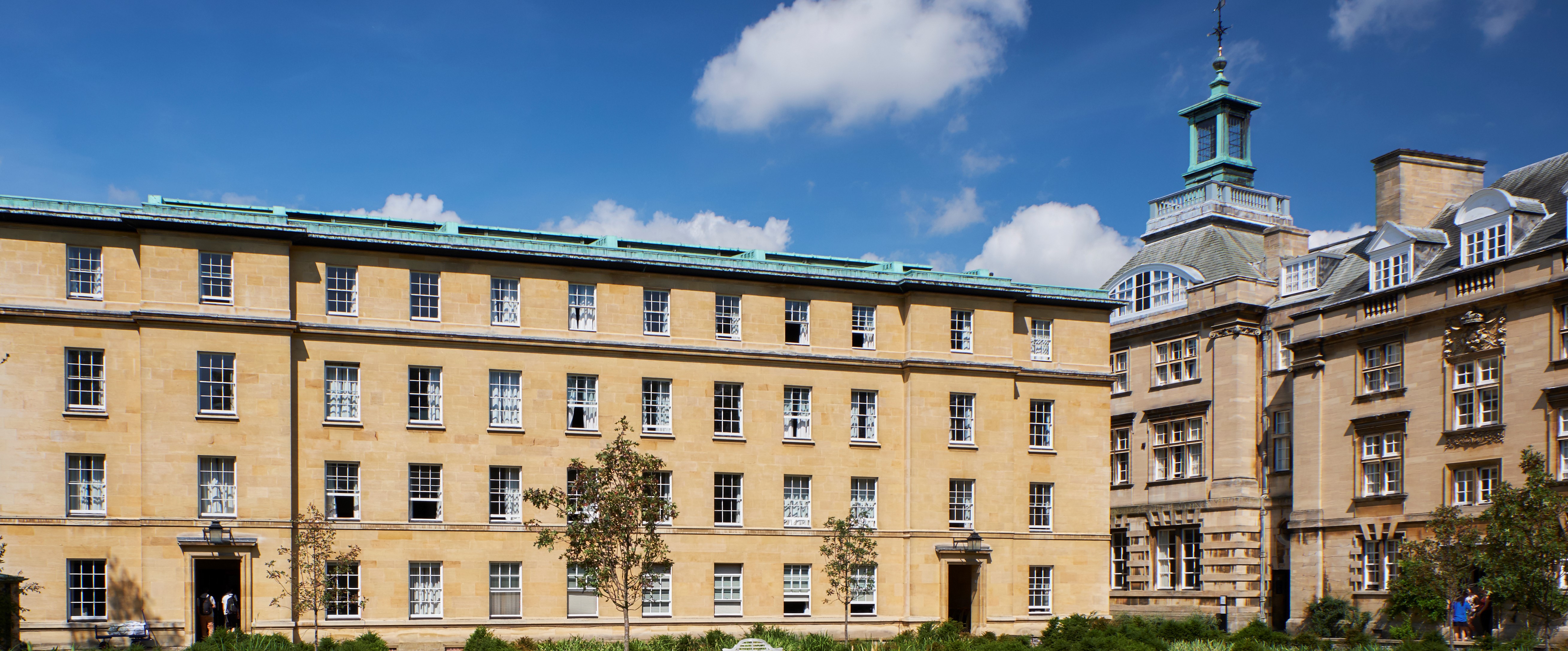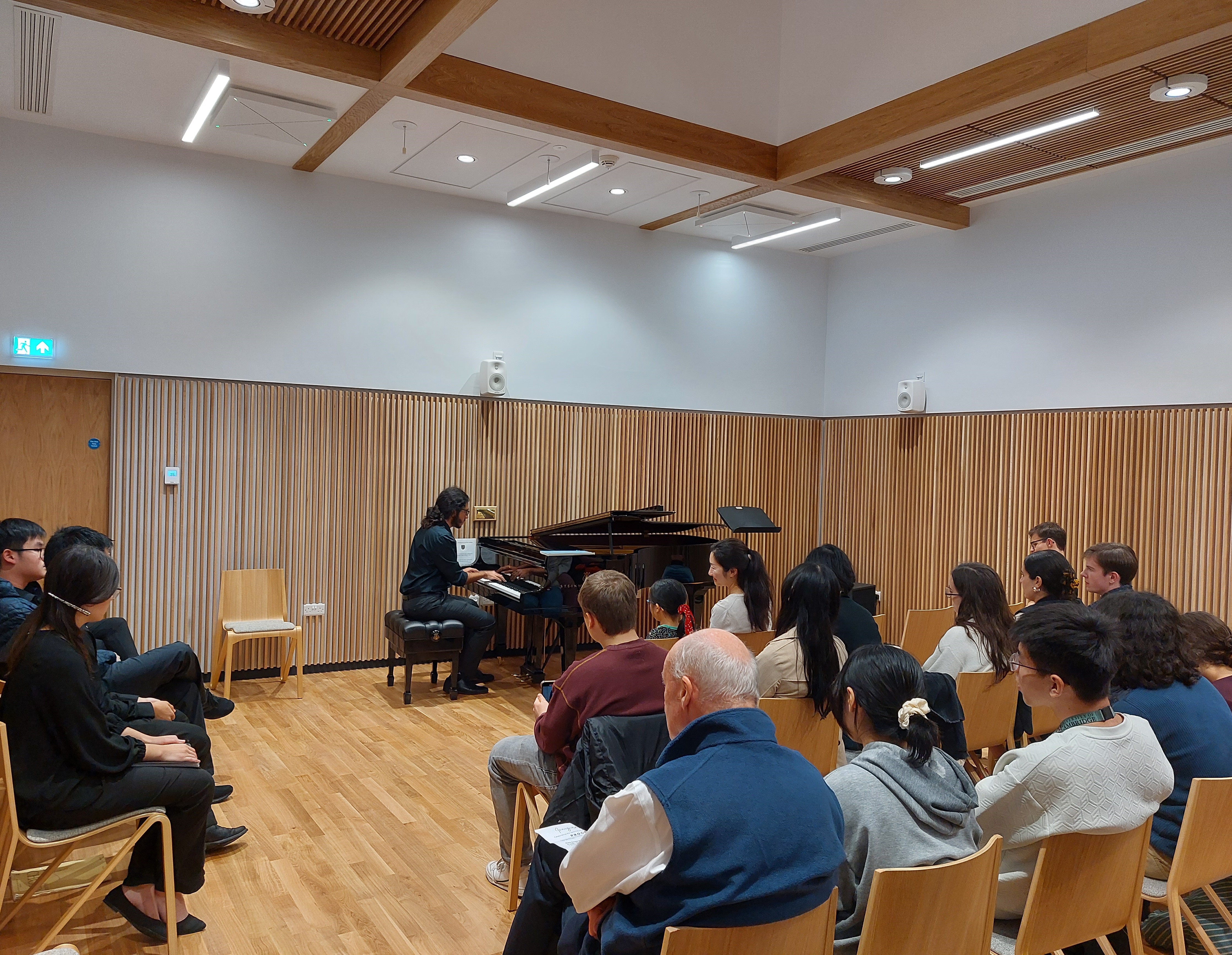
Bill Fitzgerald Music Room, in Yusuf Hamied Court (new building)
Music has always been the heart of Christ's College – from the glorious choral music of our Chapel choir to our many orchestral, vocal and chamber performances, with plenty of light-hearted musical fun in between. We’re small enough for our musicians to all know each other, and large enough to present exciting opportunities for musical collaboration at any scale.
Music and non-Music students alike are active members of Christ's College Music Society, which runs regular events including an annual dinner and informal 'squash o'clock' concerts in the Chapel. Christ's Choir is an outstanding mixed choir which sings thrice-weekly in College, regularly records CDs, and tours around the world, with regular concerts in London.
Music students have an electronic piano with headphones in their room, and can also use the College’s practice facilities. We have a number of performance spaces, including the Bill Fitzgerald Music Room, the Chapel, and the Yusuf Hamied Theatre, and there are two grand pianos and three upright pianos in College. We run a yearly performance competition where students compete for the Charles Blackham Memorial Prize. The College pays instrumental lesson fees for undergraduate Music students and travel to those lessons if needed.
Christ’s library has a wide range of course texts and readings in music history, while the Old Library holds first editions of major texts in the history of music theory, including Glaurean's Dodecachordon (1547).
Some Christ’s graduates have gone into the music profession as performers, including Rosie Bowker (flautist), Hugh Williams (organist), James McKeon (director) and Jonny Sells (baritone) or become teachers or arts administrators. Others have used this degree as a springboard into quite different careers such as law, accountancy and management.
The Music course is a three-year degree designed to let you specialise as you go along, according to your strengths and interests. As well as providing an excellent grounding in a broad range of music-specific skills, the course hones your talents for critical evaluation and analysis, communication and teamworking.
Please visit the University website for full details of the Music course content and structure, including the course film. You will also find information on the Faculty of Music degree page. If you have further questions about course content, please contact undergraduate@mus.cam.ac.uk.
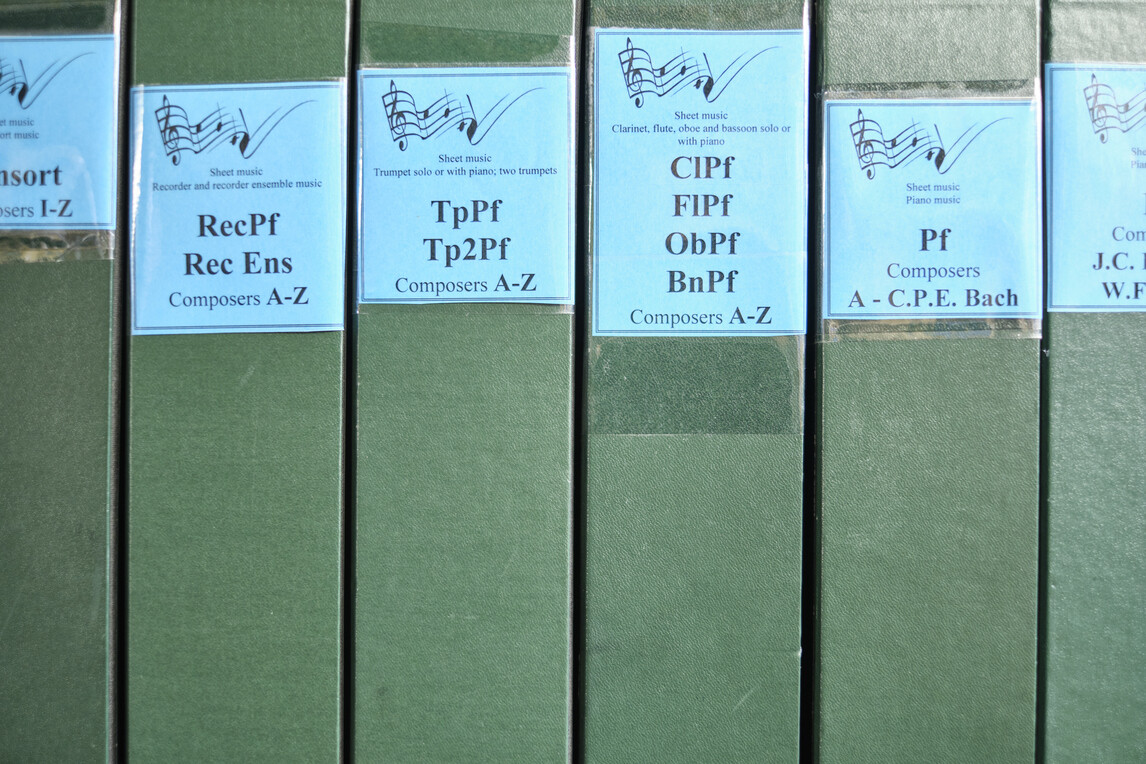
Your lectures and exams are organised by the University’s Faculty of Music. Here at College, we teach in ‘supervisions’ (tutorial sessions 1-to-1 or in pairs) to give you individually tailored tuition and support – a major advantage of a Cambridge education. We also help you develop your essay writing and research skills, and train you to use subject-specific e-resources.
Christ's Director of Studies in Music, Professor David Trippett, is a musicologist, pianist and cultural historian. He is Chair of the Faculty of Music. The Director of Music is Professor David Rowland, a conductor, keyboardist and writer; and James Way, Bye-Fellow in Music, is an internationally acclaimed tenor and Deputy Director of Performance at the Faculty of Music.
Simon, Claire and Emily studied Music here at Christ's College, Cambridge. They have written about their experiences in their student profiles:
> Simon's Profile
> Claire's profile
> Emily's Profile
If you would like to hear more from Christ's students, please watch the Christ's student Q&A film, and visit our Student Profiles page.
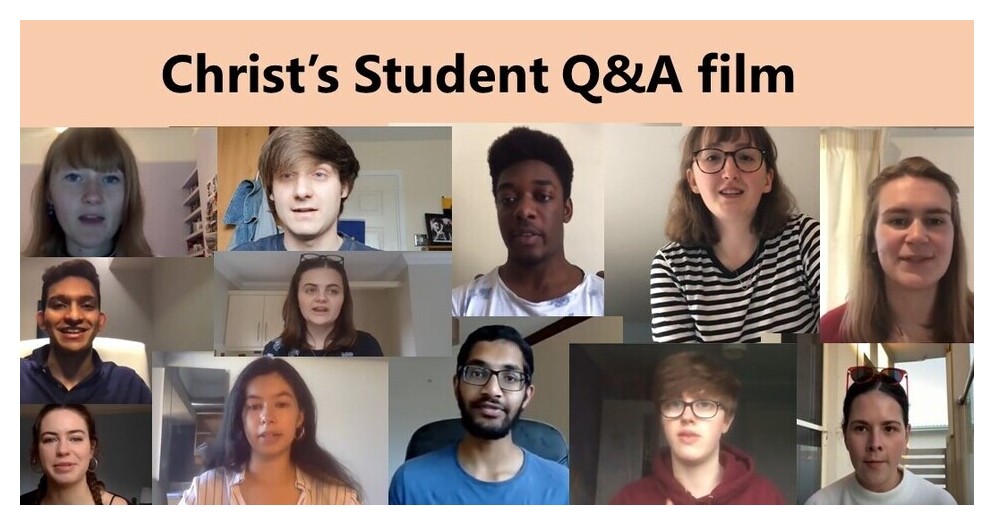
I had a lot of misconceptions about coming to Cambridge, but I’ve realised that most of them weren’t true. I found settling in to both College and the course relatively easy, as the other students were a lot friendlier than I thought they’d be and the environment in College is really supportive. Actually, one of the reasons why I would recommend Christ’s as a College is the pastoral support that the students receive here.
How to apply
Visit How to Apply for full details and a timeline of the application process. We welcome applicants from all backgrounds and school types, all over the world. If you're applying from outside the UK, please read our international students section.
There is no Admissions Assessment for Music.
We expect you to take Music as one of your post-16 subjects at A-level, IB Higher Level or equivalent. If you haven’t, you can apply with ABRSM Grade 8 in Theory with Merit (or above) instead.
It's also helpful to take an essay-based subject such as English Literature or History.
We encourage students to attend one of our regular Subject Matters webinars for help with choosing Post-16 subjects for competitive university applications. This webinar is pitched for students aged 14-16 though it is also possible to attend when you have started sixth form.
Keyboard skills are extremely useful for Part IA of the Music Tripos, and almost all successful applicants for Music hold ABRSM Grade 5 Piano or equivalent. All applicants will be asked to demonstrate keyboard skills in the course of our assessment. If you receive a offer but have not already completed ABRSM Grade 5 Piano at the point of application, we encourage you to do so before admission.
The Music course is so varied that we don’t recommend any particular activities, books or listening strategies. We find that Music students arrive for interview with a very wide range of skills and interests.
If you see yourself as a performer, you need to learn more about the works you play. That way, you can appreciate them in their historical context and analyse them and their performance history to better understand their structure, content or horizons for interpretation. If your musical interest is mainly academic, you should gain some basic composition skills in traditional areas. Good starting points would be the harmonisation of Bach chorales, the completion of two-part modal counterpoint exercises or keyboard variation sets.
Whatever your particular skills, you’ll get the most out of the Music course at Cambridge if you enjoy studying independently and are keen to pursue your own interests. Further information and helpful links are available in the resources section below.
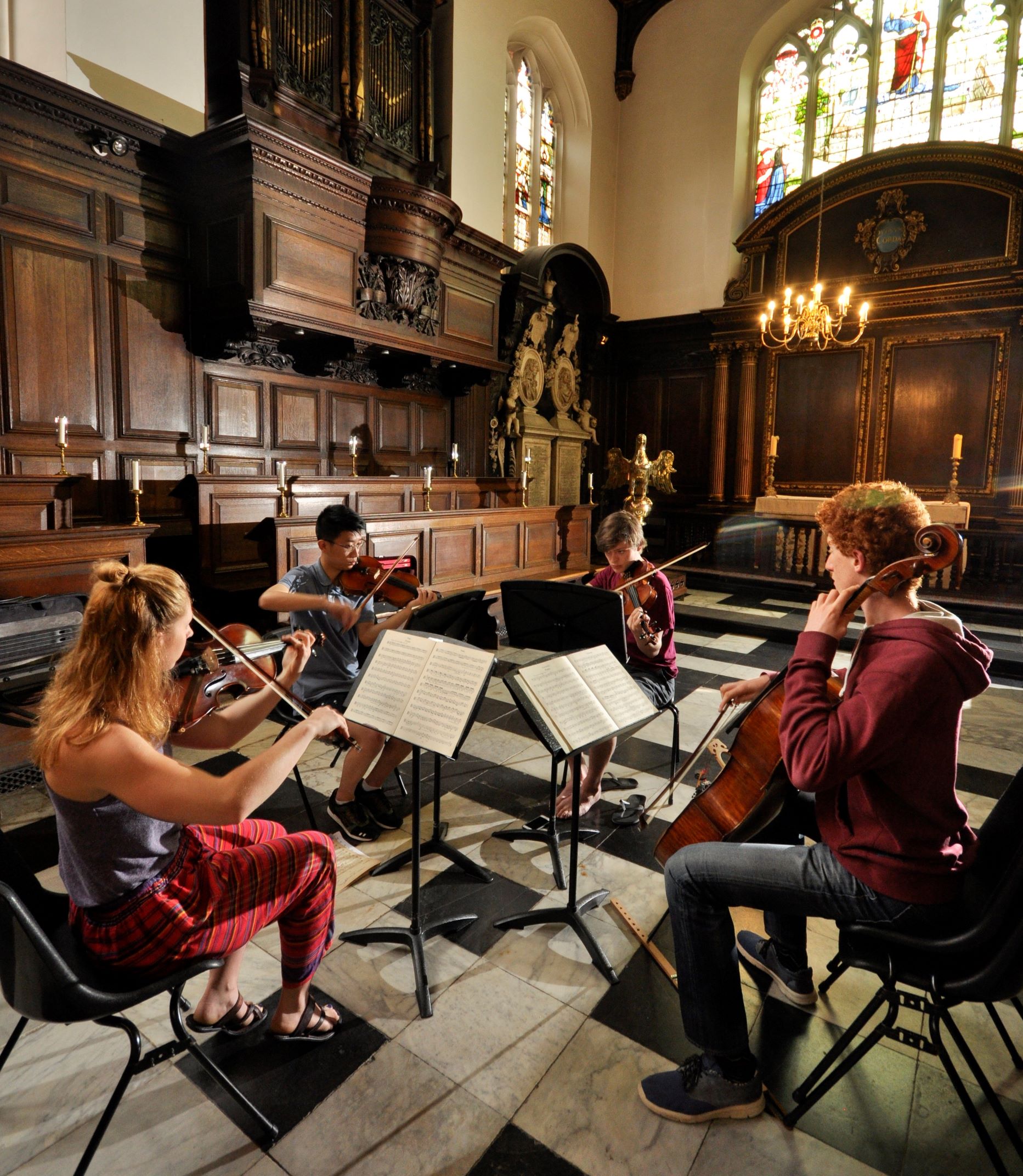
After we receive your application, we ask you to upload pieces of work that you feel accurately reflect your abilities and interests. We ask for:
> An essay, preferably on the history or analysis of music
> A harmony exercise
> (Optional) You may also send a composition if you want to - this is optional depending on your interests
This should be your own original work, prepared during the normal course of your studies and already marked by a teacher. We recommend you keep copies for your own reference as we may discuss it at interview.
We publish full guidelines on written work in the Current Applicants section on 20 September each year.
If we select you for interviews, these take place in early December. At Christ's we do all of our interviews online on Microsoft Teams. You can have your interviews either at home (most applicants do this) or at school (if easier). These online interviews normally last 35-50 minutes in total. At Christ’s, we split the time into two interviews with academics in Music. These usually involve:
> A brief aural test
> A harmonisation exercise
> An analytical discussion of a short piece of music
> A critical discussion of a piece of text relating to music
> Discussion of some general themes in the study of music
We may give you some preparation work before one of your interviews. Information about this will be in your invitation to interview.
You’re also welcome to play on your instrument, if you’d like to perform a piece during one of the interviews - this is entirely optional and depends on your interest in the performance option.
Further, more general information about interviews (including two useful films) is available in the Cambridge interviews section, and it's worth also having a look at supervisions (short film here), as interviews are similar to what you do every week as a Cambridge student.
We decide the terms of each offer individually, but our typical conditional offer is:
> A*AA at A-level including Music
> 42 points overall in the International Baccalaureate with 7,7,6 in Higher Level subjects including Music
> A1, A2, A2 in three Scottish Advanced Highers including Music
You need to be academically ambitious: the majority of Christ's students arrive with higher grades than are required.
If you’re taking another qualification, we expect you to be working at or close to the top of the mark range i.e.
> Baccalauréat français international (BFI): 17 (mention très bien) out of 20 overall, with a minimum of 17 in individual subjects including Music
> European Baccalaureate: at least 85% overall, with 9/10 in relevant subjects including Music
You can look up other qualifications in the offer levels for other exam systems and international entry requirements, and if you are applying from outside the UK please read the Christ's international students section for further information and check the country pages.
If you will have finished school when you apply, please also read about post-qualification applications, taking a gap year, and, if relevant, applying from a university.
| Guidance from the Faculty of Music | This includes reading suggestions to help you prepare for the various elements of first year Music. See also Approaches above. |
| ChoraleGUIDE: | Tom Pankhurst's resource for harmonising Bach chorales |
| Music research blog | A blog on research at the Faculty of Music |
| BBC Radio 3 - Podcasts | BBC Radio 3's Composer Of The Week is a guide to composers and their music (accessible in the UK only) |
| Discovering Music: early 20th Century | British Library resource featuring composers such as Berg, Britten, Delius, Elgar, Holst, Ravel, Schoenberg, Smyth, Stravinsky, Vaughan Williams and Webern. Access digitised treasures from the collections, sound recordings, and articles. |
| Cambridge Female Composers blog | Promoting the study and performance of music by female and non-binary composers. |
| The map of Woman Composers | Interactive map featuring more than 500 female composers |
| Faculty of Music Youtube Channel | Talks and films including recordings from the July 2020 Virtual Open Day |
| J. J. Fux's Gradus ad parnassum | This provides a good grounding in modal counterpoint (which even Beethoven studied). |
| Gresham College Music Lectures | Lectures available online |
| Essential Symphonies | From the BBC Radio 3 archive |
| Podcasts | The Art of Composing; The Labyrinth of Music Theory; Song Appeal; Musicality Now; Switched on Pop (iTunes links - those also available on Spotify in bold) |
| MusicMap | An interactive hub of popular music, showing how it is all connected. |
| Classical Music | The official website of the BBC Music Magazine, featuring podcasts, reviews and artist interviews. |
| HE+ Music | Website for secondary school students who would like to explore Music |
| CamGuides | Introducing the academic and information skills that you will need during your studies, as well as how and where you will be working. |
Becoming extremely comfortable with conventional four-part harmony is essential, as it will help not only with the actual harmony and counterpoint papers, but also with analysis. Trying to practice aural training would also be useful (although don’t worry if you find this difficult – many of us still do!).
Come to an open day or online event
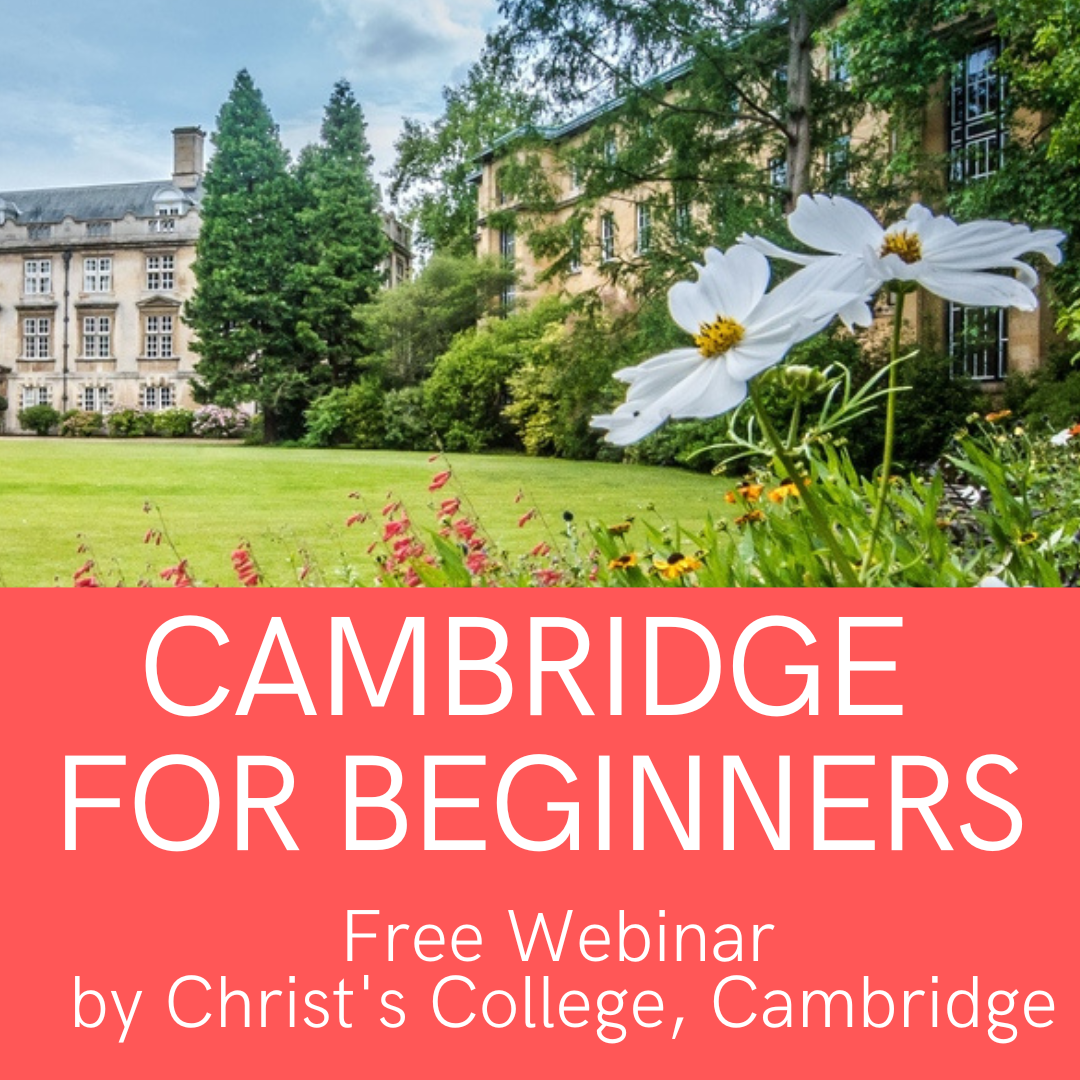
Our open days and events page advertises regular online opportunities as well as events you can attend in Cambridge. Between February and August we run regular webinars:
> Subject Matters: The importance of post-16 subject choices
> Cambridge for Beginners
> Understanding Student Finance
> Personal Statements and preparing for an application
> Webinars for applicants outside the UK
For Music, see in particular
> College Open Days
> Christ's Online Subject Meetings in May
> Music taster days (eligibility criteria apply)
> Cambridge SU Shadowing Scheme (eligibility criteria apply)
> Sutton Trust Summer School (eligibility criteria apply)
For more detail of what the course involves, read Undergraduate Music admissions on the University website, and take a look at the Faculty of Music information for prospective students too.
For information about extra-curricular music at Christ's, see the Music Society page in the student life section.
If you have any other questions, send them to us at admissions@christs.cam.ac.uk. We’re here to help.

